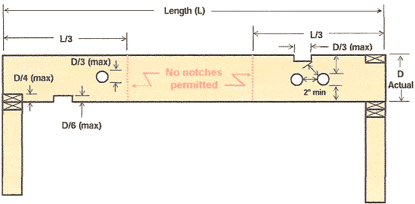Short videos and slideshow documenting our attempt at replacing rotten joists and flooring in a kitchen of a house we are currently renovating.
Replacing floor joists building regulations.
This will create a weak spot.
Air vents should be placed underneath to provide ventilation to the void and the air should be able to travel from one side of the building to the other.
This helps the joist turn into the proper resting position.
Then use pry bars and your reciprocating saw to pry and cut the floor joist away from the subfloor.
It will will a lovely job getting the new floor level.
Insulation is then placed between the joists thickness depends on the product used.
A good rule of thumb for floor joists is to lift them no more than 1 8 per day.
I am looking at stripping the floor back and replacing all the joists.
Floor joists can also be attached to a full depth header rim joist or to an adjacent stud.
The following table gives details of allowable spans and spacing between joists for the most common timber sizes used in floor construction.
But if there s limited access to the joists it may be necessary to work from above removing the flooring and subflooring to repair or replace any damaged floor joists.
Start by cutting out a small 1 2 in 2 5 5 1 cm section of the floor joist with a reciprocating saw.
Pry the floor joist from the subfloor with the back of your hammer.
If the new joist is hitting a beam and the floor above and jacking is not an option an alternative approach is to cut small bevels on the two opposing edges that the touch the beam and floor board.
The maximum depth of a notch at the end of a joist where it rests on a wall or beam can t exceed one quarter of the joist depth.
Our 1850s house has sagging 1st floor joists.
All the figures are based on normal domestic floor loadings where the floor construction is typically 18 25mm floor boards sheets with up to 12 5mm thick plasterboard and skim underneath.
Maximum notch depth in the outer third of a joist is one sixth of the joist depth.
Limit the length of notches to one third of the joist depth.
Section r502 7 of the 2009 international residential code specifies that joists must be laterally supported by solid blocking that s not less than 2 inches thick and the full depth of the joist.
A damp proof course dpc should be placed between the timber and the wall.
I had a chat with building control today and it seems that any less than 50 joist replacement is a repair and they won t need to be involved.
This part of.
A couple are also riddled with woodworm another has been poorly repaired in the past.










